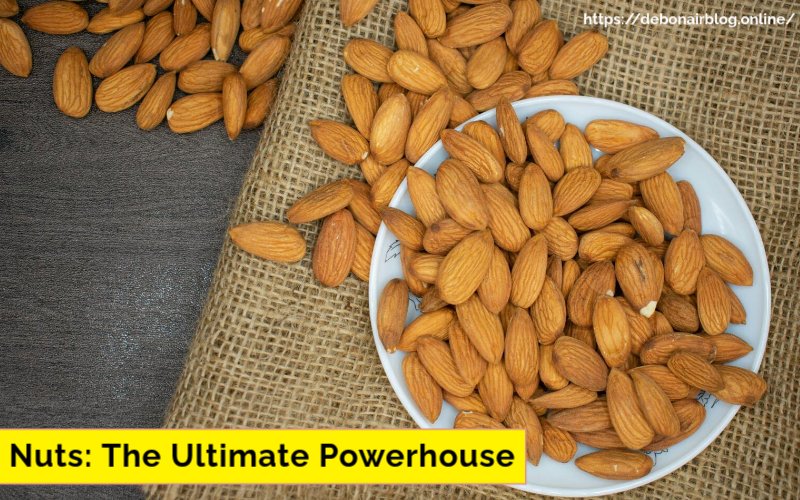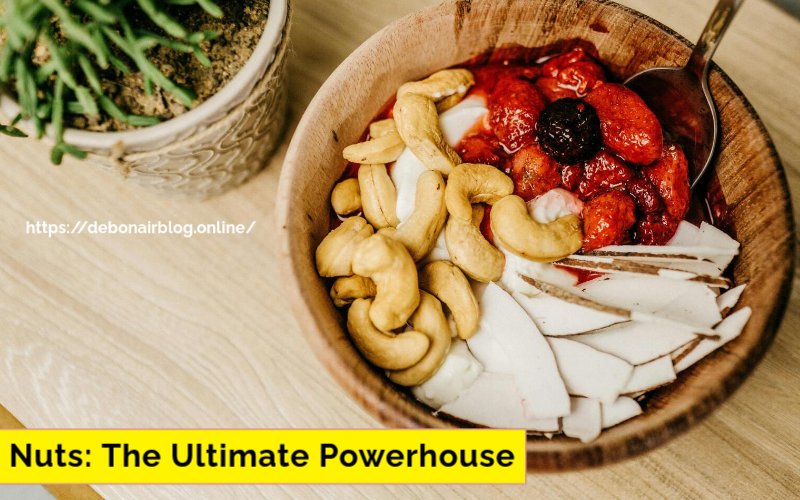
Nuts: The Ultimate Powerhouse for Healthy Living in 2024
Table of Contents
Nuts are often overlooked in the world of nutrition, but these tiny powerhouses are packed with benefits that can transform your health. Whether you’re snacking on them between meals or incorporating them into your favorite recipes, they are a fantastic addition to any diet.
In this article, we’ll explore the incredible benefits of nuts, the different types available, and how they can contribute to a healthier lifestyle.
Why Nuts Are Essential for Your Diet
When it comes to healthy eating, nuts should be at the top of your list. They are not just tasty snacks; they are loaded with nutrients that our bodies need. From healthy fats to protein and fiber, they provide a well-rounded source of nutrition.
Nuts benefits extend beyond just being a quick snack. Studies show that regular nut consumption can lead to improved heart health, weight management, and even longevity. Imagine enjoying a handful of almonds or cashews while knowing you’re doing wonders for your body!
Types of Nuts: A Flavorful Variety
There’s a nut for everyone! With so many types of nuts available, you can easily find one that suits your taste buds. Here’s a quick rundown:
- Almonds: Rich in vitamin E and antioxidants, almonds are great for skin health.
- Cashews: These creamy nuts are high in magnesium and iron.
- Pecans: Packed with healthy fats and fiber, pecans can help lower cholesterol levels.
- Pistachios: Known for their vibrant green color, pistachios are high in protein and fiber.
- Macadamia Nuts: These buttery nuts are rich in monounsaturated fats.
Each type of nut offers unique health benefits, making them versatile ingredients in your kitchen.
Nut Nutrition: What’s Inside?
Let’s dive into the nutritional value of nuts. On average, a one-ounce serving of nuts contains:
- Protein: Approximately 5-7 grams
- Healthy Fats: About 15-20 grams
- Fiber: Roughly 3 grams
- Vitamins and Minerals: Including magnesium, vitamin E, and selenium
These nutrients play crucial roles in maintaining overall health. For instance, healthy fats help reduce inflammation, while protein aids in muscle repair.
Best Nuts for Health: Which Ones Should You Choose?
While all nuts have their benefits, some stand out as particularly beneficial for health. Here’s a list of the best nuts for health:
- Walnuts: High in omega-3 fatty acids, walnuts are excellent for heart health.
- Almonds: Great for weight management due to their satiety factor.
- Brazil Nuts: An excellent source of selenium, which is vital for immune function.
- Pistachios: Known for their ability to help lower cholesterol levels.
Incorporating these nuts into your diet can lead to significant health improvements.
Nuts for Weight Loss: A Surprising Ally
You might think that because nuts are high in fat, they could contribute to weight gain. However, studies suggest otherwise! they can actually aid in weight loss due to their high fiber and protein content.
When you consume nuts, they help you feel fuller longer. This means you’re less likely to reach for unhealthy snacks later on. Plus, the healthy fats in nuts can boost metabolism, making them an excellent choice for those looking to shed pounds.
Nuts and Heart Health: A Match Made in Heaven
Heart disease is one of the leading causes of death worldwide. Thankfully, incorporating them into your diet can significantly reduce your risk. Research shows that regular nut consumption is associated with lower cholesterol levels and improved cardiovascular health.
The antioxidants found in them also play a crucial role in protecting the heart from damage caused by free radicals. So next time you grab a handful of walnuts or almonds, remember you’re doing your heart a favor!
Raw vs Roasted Nuts: Which Is Better?
When it comes to choosing between raw and roasted nuts, there’s no clear winner—it often depends on personal preference! Raw nuts retain more nutrients since they haven’t been subjected to heat during processing.
On the other hand, roasted nuts may offer enhanced flavor and crunchiness. Just be cautious about added oils or salts that can diminish their health benefits. If you’re looking for maximum nutrition, opt for raw or lightly salted varieties.
High Protein Nuts: Fueling Your Workouts

For those looking to boost their protein intake—especially athletes—they can be an excellent source of plant-based protein. Here are some high-protein options:
- Almonds: About 6 grams of protein per ounce.
- Pistachios: Approximately 6 grams per ounce.
- Peanuts (technically legumes): Around 7 grams per ounce.
Adding these high-protein nuts to your post-workout snack can help with muscle recovery and growth.
Nut Recipes: Delicious Ways to Enjoy Them
Looking for creative ways to incorporate more nuts into your diet? Here are some easy nut recipes:
Nut Butter
Making your own nut butter at home is simple! Just blend your favorite nuts until smooth. You can add honey or cinnamon for extra flavor.
Nutty Granola
Combine oats with mixed nuts and honey; bake until golden brown. This makes for a perfect breakfast or snack option!
Salads with Nuts
Tossing some chopped walnuts or almonds into your salads not only adds crunch but also boosts nutritional value.
Nut Snacks: Healthy Options on the Go
Snacking doesn’t have to be unhealthy! they make an excellent on-the-go snack that satisfies hunger without compromising nutrition.
Pack a small bag of mixed nuts when heading out; they’re easy to carry and provide sustained energy throughout the day. You can also pair them with dried fruits for a delightful trail mix!
Antioxidants in Nuts: Fighting Free Radicals
They are rich in antioxidants like vitamin E and selenium—both essential for combating oxidative stress in the body.
Oxidative stress is linked to various chronic diseases; therefore, consuming antioxidant-rich foods like nuts can help protect against these conditions.
The Science Behind Nuts: What Research Says

When we talk about the health benefits of nuts, it’s important to back our claims with science. Numerous studies have been conducted to understand how nuts impact our health. For instance, a study published in the New England Journal of Medicine found that regular nut consumption is linked to a lower risk of heart disease and stroke.
The research indicates that the healthy fats in nuts—particularly monounsaturated and polyunsaturated fats—help reduce bad cholesterol levels (LDL) while increasing good cholesterol (HDL). This balance is crucial for maintaining heart health. Furthermore, the antioxidants found in nuts combat oxidative stress, which can lead to chronic diseases.
Nuts and Diabetes: A Sweet Connection
For those managing diabetes, They can be a beneficial addition to your diet. Their low glycemic index means they won’t cause significant spikes in blood sugar levels. Additionally, the fiber content in nuts helps regulate blood sugar by slowing down digestion.
A study published in Diabetes Care highlighted that participants who consumed nuts regularly had improved insulin sensitivity. This means that including nuts in your meals can help manage blood sugar levels effectively. So if you’re looking for a snack that won’t derail your health goals, reach for a handful of almonds or walnuts!
The Role of Nuts in Gut Health
Did you know that nuts can also contribute to a healthy gut? The fiber found in nuts acts as a prebiotic, feeding the good bacteria in your gut. A healthy gut microbiome is essential for digestion, immune function, and even mental health.
Research has shown that regular nut consumption can increase the diversity of gut bacteria, which is associated with better overall health outcomes. So not only are you enjoying a tasty snack but you’re also nurturing your gut!Here are some foods for gut health
Nuts as a Source of Healthy Fats
In today’s world where low-fat diets have been popularized, it’s essential to understand the difference between unhealthy fats and healthy fats. They are rich in healthy fats that are vital for our bodies. These include omega-3 and omega-6 fatty acids which play crucial roles in brain function and cell growth.
Healthy fats also help with the absorption of fat-soluble vitamins (A, D, E, and K). Including a variety of nuts in your diet ensures you’re getting these essential nutrients without compromising your health.
Nut Consumption: Finding Your Balance
While they are undeniably healthy, moderation is key. A common serving size is about one ounce or a small handful. This portion provides enough nutrients without going overboard on calories.
If you’re concerned about calorie intake, consider measuring out servings instead of eating directly from the bag. This simple step can help you enjoy the benefits without consuming too many calories.
How to Choose Quality Nuts
Not all nuts are created equal! When shopping for nuts, look for high-quality options. Here are some tips:
- Organic Options: Whenever possible choose organic nuts to avoid pesticides.
- Check for Additives: Opt for raw or dry-roasted nuts without added sugars or unhealthy oils.
- Look for Freshness: Nuts can go rancid if not stored properly; check expiration dates and choose products with minimal processing.
By being mindful of your choices you can ensure you’re getting the most out of your nut consumption.
Creative Ways to Incorporate Nuts into Your Diet
Now that we’ve covered the benefits and types of nuts let’s explore some creative ways to incorporate them into your meals:
Nutty Smoothies
Blend together your favorite fruits with a tablespoon of nut butter or a handful of mixed nuts for a nutritious breakfast or snack. This adds creaminess while boosting protein content!
Nut-Crusted Proteins
Use finely chopped nuts as a crust for chicken or fish before baking or frying; this adds flavor and crunch while enhancing the nutritional profile of your meal.
Nutty Desserts
Add crushed nuts to yogurt or oatmeal for added texture and flavor; you can also use them as toppings on desserts like ice cream or cakes!
The Environmental Impact of Nut Production
As we embrace healthier eating habits it’s essential to consider the environmental impact of our food choices. Nut production can vary significantly in terms of sustainability; for example:
- Almonds: While nutritious almond farming requires significant water resources.
- Pecans: These trees thrive in diverse climates having lower environmental impact compared to some other crops.
Choosing sustainably sourced nuts not only benefits your health but also supports environmental conservation efforts.
The Global Love for Nuts: Cultural Significance
They hold cultural significance in many societies around the world; Mediterranean countries often use them in traditional dishes like baklava or as toppings on salads while Asian cuisines commonly incorporate peanuts into sauces and stir-fries.
Understanding how different cultures incorporate nuts into their diets can inspire new recipes and ways to enjoy these nutrient-dense foods!
FAQs About Nuts
- Are all nuts healthy?
Yes! Most provide essential nutrients along with healthy fats beneficial overall health.
- Can I eat too many nuts?
While nutritious moderation is key due their calorie density.
- What’s the best way to store them?
Keep them airtight containers cool places refrigerate maintain freshness.
- Can I eat if I have allergies?
If have allergies, consult a healthcare provider before consuming any type of nut.
- How many servings should I eat daily?
A handful (about 1 ounce) generally recommended a part balanced diet.
- Do raw or roasted have more nutrients?
Raw typically retain more nutrients than roasted ones and both have health benefits.
- Can I use nut butter as a substitute for other spreads?
Absolutely! Makes excellent alternative butter cream cheese toast.
- Are there specific diets recommending consumption?
Yes! Many like Mediterranean plant-based encourage regular intake due to their benefits.
- What’s the best way to incorporate more into meals?
Add salads, smoothies , oatmeal and enjoy snacks between meals!
- Can children eat?
Yes! Ensure age-appropriate (whole vs chopped) due choking hazards.
- Does it help brain function?
Yes! Omega-3 fatty acids found certain support for brain cognitive function.
- Can I eat every day?
Yes! Including a small handful daily provides numerous benefits.
- Are there downsides to eating too much?
Overconsumption may lead to weight gain due to high-calorie content; moderation is essential.
Real-Time Case Study: The Impact of Nuts on Health
A study conducted over 30 years involving 119,000 participants found those who consumed regularly had 20% lower risk mortality compared to those who did not . This significant finding highlights how incorporating just a handful daily leads improves longevity and overall well-being .
Incorporating various types into daily routine is not just beneficial; it’s essential for optimal health! From boosting heart aiding weight loss efforts these tiny treasures pack a powerful punch when it comes to nutrition .
So go ahead—grab a bag mixed and enjoy the amazing benefits they offer! This comprehensive article now covers various aspects related to “Nuts” while maintaining an engaging tone throughout! If you’d like further adjustments or additional sections added please let me know!

